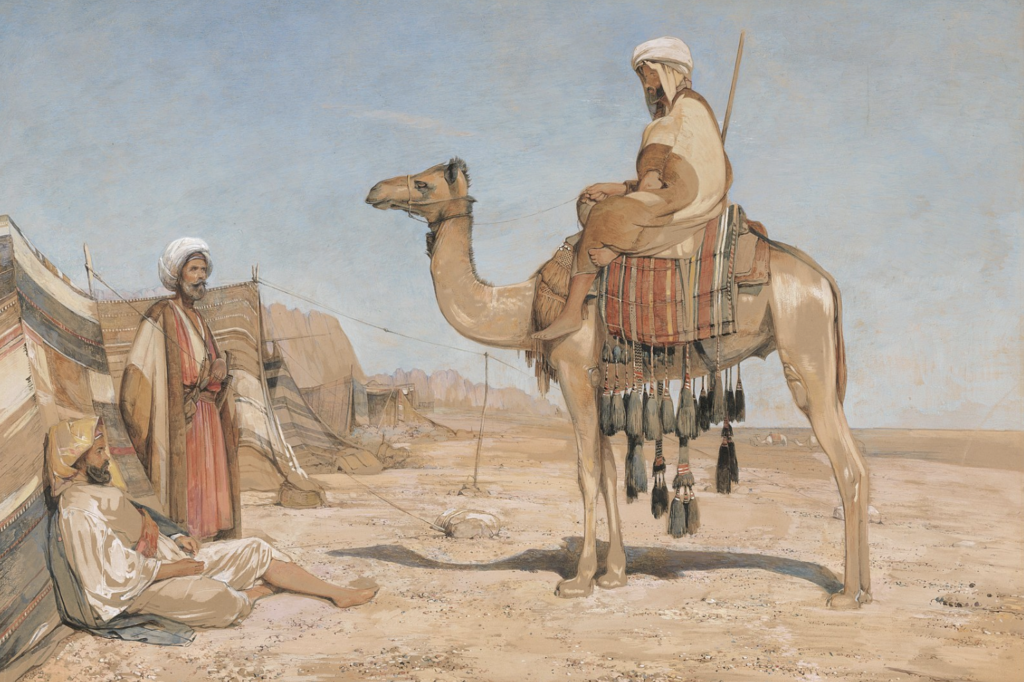Nomadic Roots: The Bedouin Legacy and Its Role in Shaping Modern Arab Identity

Photo Source: Wikimedia Commons
By: Rania Basria/ Arab America Contributing Writer
The Bedouins, a nomadic tribe that has long roamed the deserts of the Middle East and North Africa, are a fascinating tapestry of culture, history, and tenacity. Their legacy has had a major impact on modern Arab identity, defining principles that still resonate in today’s culture. Rania Basria, an Arab America contributing writer, explores the cultural and social traditions of Bedouin tribes, focusing on hospitality, oral poetry, and governance, and examines how these features have influenced the establishment of Arab ideals today.
Bedouins have historically been known for their nomadic lifestyle, which involved moving between seasonal pastures to graze their livestock, especially camels and goats. This mobility has not only affected their cultural customs, but it has also instilled a strong connection to the land and a deep reverence for nature. The hard climate of the desert required a strong sense of community and mutual support, resulting in social systems centered on extended families and tribal affiliations. These social relationships were critical to their survival and continue to impact Arab social dynamics now.
One of the most enduring aspects of Bedouin culture is the emphasis on hospitality. The habit of greeting guests with open arms is an important aspect of Arab identity. For Bedouins, providing food and shelter to travelers is more than a social obligation; it is a question of dignity. This practice is based on the concept that a guest is a blessing and demonstrates a dedication to charity and respect.
Bedouin hospitality often involves elaborate rituals. Upon entering a tent, guests are typically offered coffee, a gesture symbolizing goodwill and friendship. Sharing meals, particularly lamb and rice, is a communal affair that strengthens bonds between hosts and guests. This tradition of hospitality transcends tribal lines and reinforces the concept of community, an essential element in modern Arab societies.
Hospitality is still highly valued in modern Arab culture. It takes different forms, ranging from family gatherings to official occasions. Arab culture celebrates the principles of generosity and goodwill toward others, demonstrating the long-lasting influence of Bedouin traditions.
Bedouin poetry usually addresses themes such as love, bravery, loss, and the harsh realities of desert life. These poems are not only artistic works; they also serve as venues for social commentary and political criticism. Poets use their poems to shape public opinion and define societal values, making them significant figures in Bedouin society.
Oral poetry has left its mark on current Arab culture. Contemporary poets draw inspiration from Bedouin traditions, combining ancient themes with modern reality. Poetry readings and festivals celebrating this art form are popular throughout the Arab world, emphasizing its importance in building cultural identity and instilling a sense of belonging in Arabs. The literary tradition remains a potent tool of expressing individual and community experiences, echoing historical voices while addressing current challenges.
Bedouin tribes’ governance structures have also had an everlasting impact on modern Arab civilizations. Traditionally, Bedouin tribes were led by an elder council known as the “majlis,” which was responsible for decision-making and conflict settlement. This council system promoted a sense of shared duty and accountability, with leaders expected to act in the best interests of their communities.
Bedouins have historically been known for their nomadic lifestyle, which involved moving between seasonal pastures to graze their livestock, especially camels and goats. This mobility has not only affected their cultural customs, but it has also instilled a strong connection to the land and a deep reverence for nature. The hard climate of the desert required a strong sense of community and mutual support, resulting in social systems centered on extended families and tribal affiliations. These social relationships were critical to their survival and continue to impact Arab social dynamics now.
Bedouin tribes’ governance structures have also had an everlasting impact on modern Arab civilizations. Traditionally, Bedouin tribes were led by an elder council known as the “majlis,” which was responsible for decision-making and conflict settlement. This council system promoted a sense of shared duty and accountability, with leaders expected to act in the best interests of their communities.
The Bedouin style of governance emphasized consensus and communication, which contrasted dramatically with hierarchical systems. This participatory style has affected modern Arab governance, in which tribal affiliations and community involvement frequently play important roles in political dynamics. In many Arab countries, tribal leaders and councils continue to wield significant power, particularly in rural areas where ancient norms and practices are strongly embedded.
Furthermore, the Bedouins’ emphasis on fairness and dignity is reflected in contemporary Arab ideals. Fairness and integrity are highly valued in Arab societies, and strong communal ties frequently lead to collaborative action in resolving grievances and conflicts. This tribal governance history serves as a reminder of the value of community cohesion and justice, both of which are still relevant in modern Arab society.
Bedouin tribes’ cultural and social traditions have had a profound impact on modern Arabic identity. Their ideals of hospitality, oral poetry, and participatory governance continue to reverberate in modern Arab countries, generating a sense of unity and belonging. As the world changes, many Arabs continue to be proud and inspired by the Bedouin legacy, which reminds them of their rich heritage and the enduring value of community and custom.
In this age of globalization and rapid change, the lessons of Bedouin culture—of resilience, compassion, and social cohesion—serve as guiding principles for negotiating the complexity of contemporary life. Although the Bedouins’ nomadic roots are in the past, their legacy lives on, defining Arab identity today and for future generations.
Check out our blog here!








